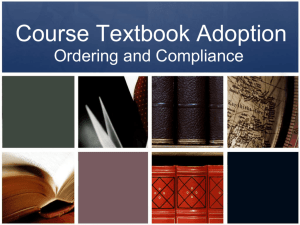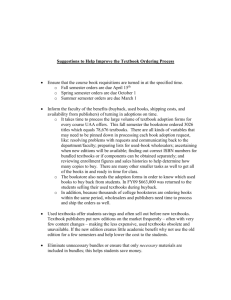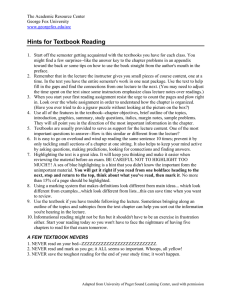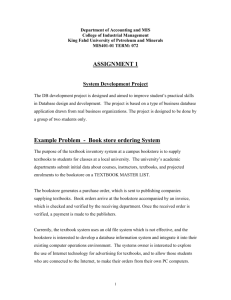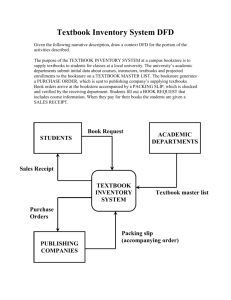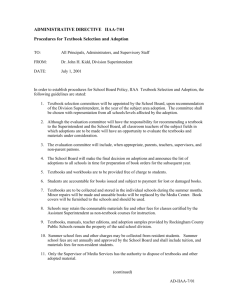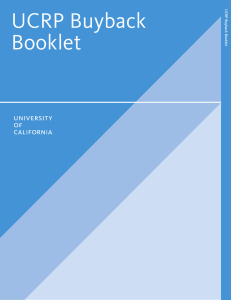$ Thank You, Faculty!
advertisement
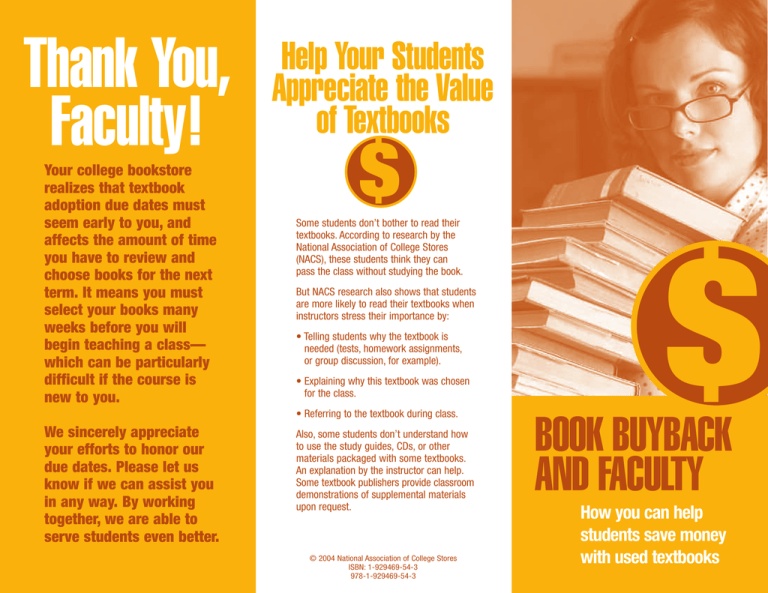
Thank You, Faculty! Your college bookstore realizes that textbook adoption due dates must seem early to you, and affects the amount of time you have to review and choose books for the next term. It means you must select your books many weeks before you will begin teaching a class— which can be particularly difficult if the course is new to you. Help Your Students Appreciate the Value of Textbooks $ Some students don’t bother to read their textbooks. According to research by the National Association of College Stores (NACS), these students think they can pass the class without studying the book. But NACS research also shows that students are more likely to read their textbooks when instructors stress their importance by: • Telling students why the textbook is needed (tests, homework assignments, or group discussion, for example). • Explaining why this textbook was chosen for the class. • Referring to the textbook during class. We sincerely appreciate your efforts to honor our due dates. Please let us know if we can assist you in any way. By working together, we are able to serve students even better. Also, some students don’t understand how to use the study guides, CDs, or other materials packaged with some textbooks. An explanation by the instructor can help. Some textbook publishers provide classroom demonstrations of supplemental materials upon request. © 2004 National Association of College Stores ISBN: 1-929469-54-3 978-1-929469-54-3 $ BOOK BUYBACK AND FACULTY How you can help students save money with used textbooks $ HOW FACULTY ARE VITAL TO BUYBACK btaining a quality education can place a financial burden on many college students. Just as the school attempts to keep tuition and fee increases to a minimum, the bookstore also tries to help students by ensuring the lowest possible prices on textbooks and course materials. O One principal way that the store tries to make textbooks more affordable is by stocking as many used books as we can. Students demand used books—used copies nearly always sell out before new copies. Where do we get used books? We buy back used copies students do not plan to keep for their personal libraries. We also purchase used books from national wholesale companies, who buy them from students at other campuses. End-of-term “buyback” not only provides a healthy supply of used books for the next term, it also gives money back to the students who do not wish to keep a particular book. Did you know that faculty play the most critical role of all in the buyback process? The buyback process really begins when the bookstore receives textbook adoption forms from faculty for the next term. Only when the store has your course requirements can we determine which used books to buy back from students on this campus, and which books to order from wholesalers and publishers. The earlier that we have textbook adoption forms in hand, the more used copies we can obtain from students and usedbook wholesalers. That’s why we need your textbook adoption information months before the next term begins. College bookstores across the continent are competing for a limited supply of used books, particularly for newer titles, which of course have fewer total used copies in circulation. If wholesalers know our campus is seeking certain titles, they will be in a better position to purchase them for us on other campuses. The store may work with more than one wholesaler in an effort to secure more used copies for students. And, if wholesalers cannot furnish all the used books we need, we still have time to order new books for delivery before classes start. HERE ARE SOME QUESTIONS THAT FACULTY OFTEN ASK ABOUT BUYBACK: I hear students complaining they receive little for their used books. How does the store determine what to pay? The value of a used book depends a great deal on whether or not that particular book is going to be used on this campus next term. The bookstore is able to pay more for books that will stay on this campus, possibly as much as half or more of the retail price of a new book. If the book is not going to be assigned here next term, however, the store will check with wholesale book companies to find out if they are buying the book. Wholesalers typically pay less because they have to add the costs of shipping and other normal business expenses to the resale price. Unless a textbook adoption form has been submitted to the store, we do not know whether a book will be used again next term. The store cannot afford to buy back books on speculation. In the absence of an adoption form, students receive only the lower wholesaler buyback rate, possibly even nothing if there is no demand elsewhere for the book. I’ve seen ads for online booksellers who offer a lot more to buy used books. Why doesn’t the store match those offers? Some online sites do claim to pay substantially higher percentages for used books, but we have found that these sellers often exaggerate how much they actually pay. Used books are provided by the bookstore as a less expensive alternative for students. Paying more at buyback ultimately means the store would have to charge students more for used books. Why doesn’t the store sell textbooks at cost? The store must add an amount to the cost of all merchandise— including both used and new textbooks—to cover our operating expenses, such as staff wages and benefits, mortgage or rent payments, freight; utilities, insurance and taxes, checkout systems, shelving, security, cleaning and repairs, supplies, and other costs. The bookstore is not a subsidized entity. In addition, the store is expected to contribute funds back to the campus community. If there is so much demand for used books, why doesn’t the store buy back every copy students bring in? There are many reasons why a book might not be bought back. Possibly the book is not being used anywhere next term. The book may be part of a required bundle of items that cannot be sold separately. The copy may be in poor condition. The store and/or wholesaler may have reached the needed amount; the number of copies we buy back is based on anticipated enrollment for the next term. We cannot afford to buy more copies than we expect to sell. Why does the store set such early deadlines for textbook adoption forms? It takes time to process the large volume of textbook adoption forms for every course this school offers. There are all kinds of variables that may need to be pinned down in processing each book adoption request, like: resolving problems with requests and communicating back to faculty; preparing lists for used-book wholesalers; seeking out availability and best prices among multiple distributors; ascertaining when new editions will be available; finding out whether textbooks bundled with other components can be obtained separately; and reviewing enrollment figures and sales histories to help determine how many copies to buy. There are many other smaller tasks as well to get all of the books in and ready in time for class. The store also needs the adoption forms in order to know which used books to buy back from students. In addition, because thousands of college bookstores are ordering books within the same period, wholesalers and publishers need time to process and ship the flood of orders as well. PC.091.01.06
